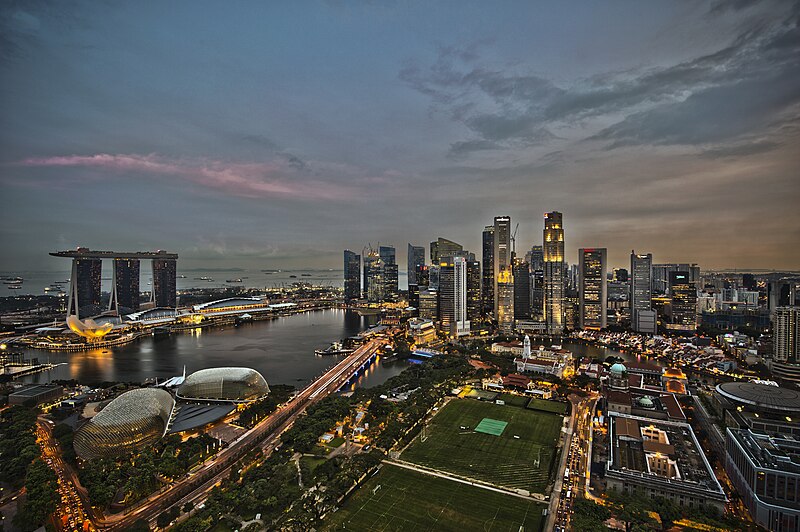1 - Work with a property agent. If you are a foreigner or you do not know what you are doing, do not try to save money by not working with a property agent. A property agent earns more if you pay higher rental (half of 1 month rental for 1 year lease from you) so do not expect him or her to try to lower the rental, they will not bother. But at least, they will keep things legal and they are less likely to be cheated by a conman then you. Rental scams in Singapore are known to exist and victims are usually the foreigners working without an agent.
2 - Be sure that the property agent is registered. Since January 2011, conducting estate agency work without a valid licence or registration is an offence in Singapore. All registered agents now have their CEA (Council of Estate Agency) license numbers. Be sure that you have this number checked. You will see it on agents business card (I think it is mandatory to put it in the name card). He/She will have 2 numbers: Estate Agents Licence No / Salesperson RegNo. Check these numbers online from CEA page. Click the search sales person and enter Salesperson RegNo. Follow the link in the search result and make sure that the property agents name match and he/she is the person on the photo.
3 - Check if the unit is approved for rent. Public housing flats, known as HDB after the government body building them, requires approval to be rented out. "Request the flat owner to show you a copy of the approval letter to rent out their flat, as obtained from HDB."[1] Housing Development Board (HDB) also advises you to put a condition in contract that the validity of the contract is subject to the flat owner obtaining the approval.[1]
4 - Check the owner is really the owner. Fake landlord scams are quite common around the world and Singapore is not an exception. First visit the flat before renting it. This may be obvious but some foreigners who forget to request a temporary stay from the employer on arrival desperately try to rent a place from abroad and fall into this trap easily.
But even if the person has access to the flat, this does not prove he/she is the landlord. Be sure you have documented proof of ownership before giving away money or signing up a contract. Some documents which can prove ownership are "Agreement for Lease, Service & Conservancy charges booklet, Annual or Loan instalment payment booklet/Annual Loan statements, bearing the name of the flat owner"[1].
5 - Do not advance pay. Some people find it attractive to pay in advance for a discount. This may cost them a small fortune. A friend of mine lost a small fortune 2-3 years ago by doing so. His landlord with money problems asked him to pay 5 months in advance so he could stay 1 month free. Although everyone advised him not to do so, he paid the money. 2 months later the flat was possessed by the bank and he was asked to leave. He tried to recover his money back but he was not successful. You cannot imagine how easy it is to get lost for someone, by simply changing his address.
How much should you pay? 1 year lease requires 1 month rent + 1 month rent as deposit payment after contract is signed and 2 year lease requires 1 month rent + 2 months rent as deposit. Avoid any scheme other than this.
6 - Know your options. Many foreigners come to Singapore with a temporary place to live before finding a rental unit. I think the standard is 1-2 months temporary flat. In a hurry, they do not make decisions based on all available options. And it seems like many property agents make these foreigners think like a private property unit is the only practical option for them to live in. If you are on expat package paying your rent, or you earn really high this is not an issue. But I see many foreigners stretching their budget and sacrificing their comfort by squeezing themselves into smaller private units with higher rental prices. Smaller and higher compared to public housing units.
In Singapore you can rent a public housing unit (called HDB) by a valid work pass. 80 per cent of Singaporeans live in these units as well as many foreigners working here. Although there are many old and bad units of HDBs out there there are very good ones as well. The catch is you can for example rent a large 4 - 5 rooms furnished HDB flat with a very good condition by 2,300 - 2,800 SGD per month and live comfortably while same sized unit of a private resident would cost you easily 4,500 SGD+ per month. There is absolutely no reason to try to fit into a shoe box (less than 500 square feet units) for 3,000+ SGD when a large 4 room flat can be rented by 2,500 SGD per month.
Singaporeans, especially the ones in HDB units are very friendly people, HDB is a great place to taste the culture here and they are usually surrounded with better amenities than condominiums. Plus you can save up to 20,000 - 30,000 SGD per year by living in an HDB. It is not only on rent you save. You save on every other cost as well (HDB flats are surrounded with cheaper and wider eating and shopping places than condominiums).
7 - Bargain, bargain, bargain. This is Asia, here we bargain. So landlords assumes that you may bargain and ask a higher price than they are willing to get. Offer 20 per cent less (at least) than the asking price and bargain hard.
[1] - Steps Involved in Renting a flat
2 - Be sure that the property agent is registered. Since January 2011, conducting estate agency work without a valid licence or registration is an offence in Singapore. All registered agents now have their CEA (Council of Estate Agency) license numbers. Be sure that you have this number checked. You will see it on agents business card (I think it is mandatory to put it in the name card). He/She will have 2 numbers: Estate Agents Licence No / Salesperson RegNo. Check these numbers online from CEA page. Click the search sales person and enter Salesperson RegNo. Follow the link in the search result and make sure that the property agents name match and he/she is the person on the photo.
3 - Check if the unit is approved for rent. Public housing flats, known as HDB after the government body building them, requires approval to be rented out. "Request the flat owner to show you a copy of the approval letter to rent out their flat, as obtained from HDB."[1] Housing Development Board (HDB) also advises you to put a condition in contract that the validity of the contract is subject to the flat owner obtaining the approval.[1]
4 - Check the owner is really the owner. Fake landlord scams are quite common around the world and Singapore is not an exception. First visit the flat before renting it. This may be obvious but some foreigners who forget to request a temporary stay from the employer on arrival desperately try to rent a place from abroad and fall into this trap easily.
But even if the person has access to the flat, this does not prove he/she is the landlord. Be sure you have documented proof of ownership before giving away money or signing up a contract. Some documents which can prove ownership are "Agreement for Lease, Service & Conservancy charges booklet, Annual or Loan instalment payment booklet/Annual Loan statements, bearing the name of the flat owner"[1].
5 - Do not advance pay. Some people find it attractive to pay in advance for a discount. This may cost them a small fortune. A friend of mine lost a small fortune 2-3 years ago by doing so. His landlord with money problems asked him to pay 5 months in advance so he could stay 1 month free. Although everyone advised him not to do so, he paid the money. 2 months later the flat was possessed by the bank and he was asked to leave. He tried to recover his money back but he was not successful. You cannot imagine how easy it is to get lost for someone, by simply changing his address.
How much should you pay? 1 year lease requires 1 month rent + 1 month rent as deposit payment after contract is signed and 2 year lease requires 1 month rent + 2 months rent as deposit. Avoid any scheme other than this.
6 - Know your options. Many foreigners come to Singapore with a temporary place to live before finding a rental unit. I think the standard is 1-2 months temporary flat. In a hurry, they do not make decisions based on all available options. And it seems like many property agents make these foreigners think like a private property unit is the only practical option for them to live in. If you are on expat package paying your rent, or you earn really high this is not an issue. But I see many foreigners stretching their budget and sacrificing their comfort by squeezing themselves into smaller private units with higher rental prices. Smaller and higher compared to public housing units.
In Singapore you can rent a public housing unit (called HDB) by a valid work pass. 80 per cent of Singaporeans live in these units as well as many foreigners working here. Although there are many old and bad units of HDBs out there there are very good ones as well. The catch is you can for example rent a large 4 - 5 rooms furnished HDB flat with a very good condition by 2,300 - 2,800 SGD per month and live comfortably while same sized unit of a private resident would cost you easily 4,500 SGD+ per month. There is absolutely no reason to try to fit into a shoe box (less than 500 square feet units) for 3,000+ SGD when a large 4 room flat can be rented by 2,500 SGD per month.
Singaporeans, especially the ones in HDB units are very friendly people, HDB is a great place to taste the culture here and they are usually surrounded with better amenities than condominiums. Plus you can save up to 20,000 - 30,000 SGD per year by living in an HDB. It is not only on rent you save. You save on every other cost as well (HDB flats are surrounded with cheaper and wider eating and shopping places than condominiums).
7 - Bargain, bargain, bargain. This is Asia, here we bargain. So landlords assumes that you may bargain and ask a higher price than they are willing to get. Offer 20 per cent less (at least) than the asking price and bargain hard.
[1] - Steps Involved in Renting a flat












